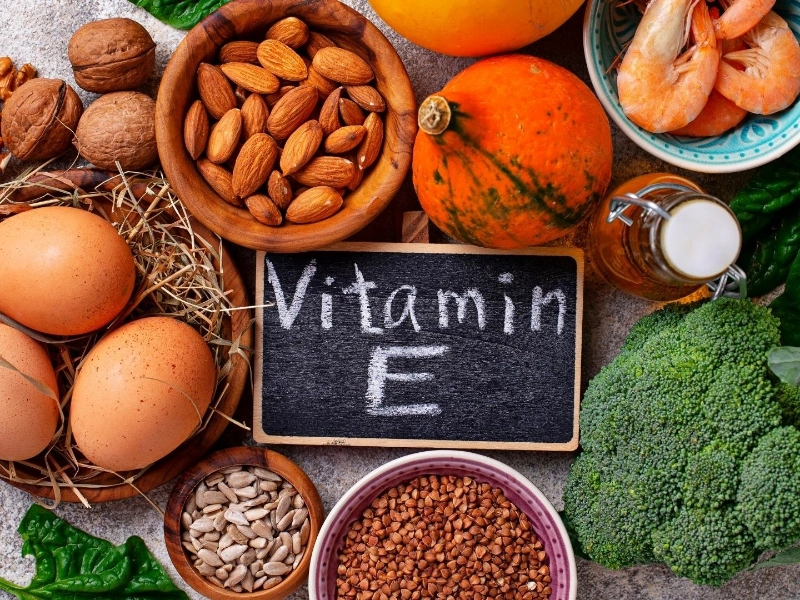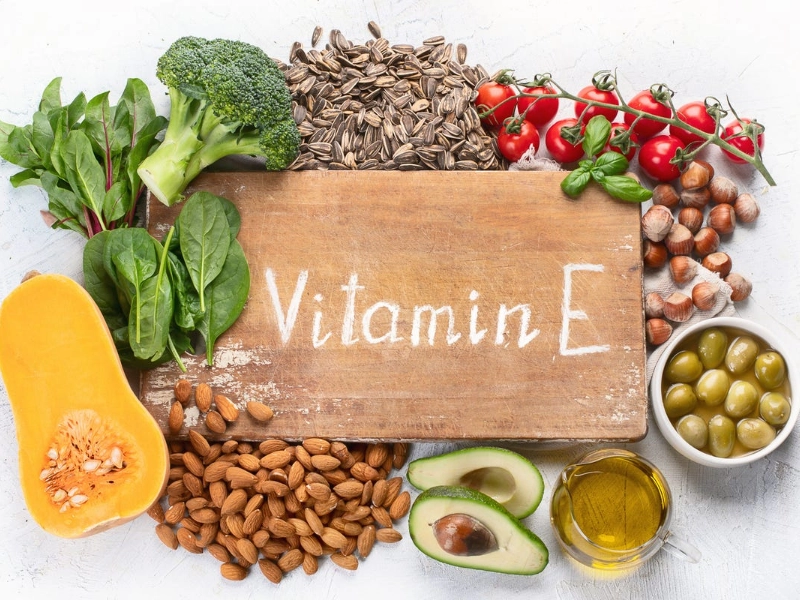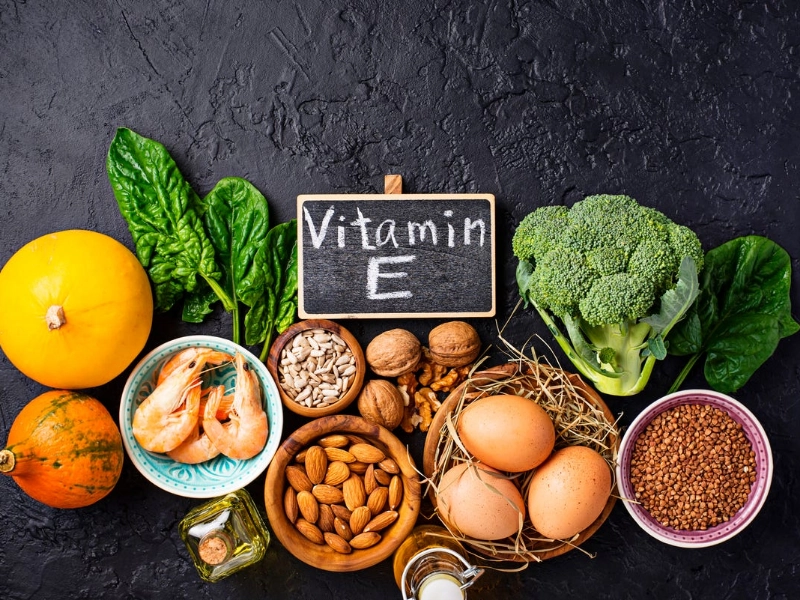Vitamin E: An Important Nutrient for General Health and Lifespan
Eight fat-soluble substances with antioxidant properties make up vitamin E. It is a nutritional supplement as well as an ingredient in some dishes. [1] Adults should take 15 milligrammes daily as recommended. It strengthens the immune system and functions as a chain-breaking antioxidant to prevent oxidation of polyunsaturated fatty acids found in membranes and lipoproteins.
It Aids in Cancer Prevention

It Aids in Heart Disease Prevention
 An antioxidant that can help avoid heart disease is vitamin E. It can be added to certain meals, found naturally in others, and bought as a nutritional supplement. This vitamin is fat-soluble and is kept in the liver and adipose tissue. It is also necessary for immune system maintenance and cell function.
Numerous studies indicate that by lessening the oxidation of low-density lipoprotein (LDL) cholesterol, vitamin E may mitigate the risk of atherosclerotic cardiovascular disease (ASCVD) events, including coronary mortality, nonfatal myocardial infarction, and stroke. However, a number of sizable clinical trials, such as the Women's Angiographic Vitamin and Oestrogen Trial and the Health Professionals Follow-up Study, have demonstrated that consuming 400 IU/d of synthetic alpha-tocopherol or a mix of vitamin C and E does not significantly lower the incidence of coronary artery disease in healthy individuals.
Furthermore, extra vitamin E did not protect against ASCVD events in individuals at high risk for cardiovascular disease who already had diabetes or mild chronic renal disease, according to the Hope-Too research. This finding is in line with recent randomised clinical trials involving patients at high risk for cardiovascular disease that found that supplementing with vitamin E did not protect against CV outcomes.
An antioxidant that can help avoid heart disease is vitamin E. It can be added to certain meals, found naturally in others, and bought as a nutritional supplement. This vitamin is fat-soluble and is kept in the liver and adipose tissue. It is also necessary for immune system maintenance and cell function.
Numerous studies indicate that by lessening the oxidation of low-density lipoprotein (LDL) cholesterol, vitamin E may mitigate the risk of atherosclerotic cardiovascular disease (ASCVD) events, including coronary mortality, nonfatal myocardial infarction, and stroke. However, a number of sizable clinical trials, such as the Women's Angiographic Vitamin and Oestrogen Trial and the Health Professionals Follow-up Study, have demonstrated that consuming 400 IU/d of synthetic alpha-tocopherol or a mix of vitamin C and E does not significantly lower the incidence of coronary artery disease in healthy individuals.
Furthermore, extra vitamin E did not protect against ASCVD events in individuals at high risk for cardiovascular disease who already had diabetes or mild chronic renal disease, according to the Hope-Too research. This finding is in line with recent randomised clinical trials involving patients at high risk for cardiovascular disease that found that supplementing with vitamin E did not protect against CV outcomes.
It Aids in Avoiding Eye Conditions
 Alpha-tocopherol, often known as vitamin E, is an antioxidant that lessens light glare and helps shield the eyes from oxidation. This nutrient also guards against the harm caused by free radicals, which can result in cataracts. Eating foods high in vitamin E is crucial, as are foods high in other minerals that support eye health, like zinc, lutein, vitamin A, and zeaxanthin.
According to certain research, antioxidants like vitamin E may be able to stop cataracts and age-related macular degeneration (AMD). A 400-IU vitamin E supplement combined with additional antioxidants including zinc, folic acid, and beta-carotene has been demonstrated to halt the advancement of AMD in those who are at high risk of the illness. Nonetheless, the best method to obtain the nutrients that are beneficial for your eyes is to consume a balanced diet. Consult your doctor before taking any vitamin E supplements or other antioxidants if you plan to use radiation therapy or specific cancer medications.
Alpha-tocopherol, often known as vitamin E, is an antioxidant that lessens light glare and helps shield the eyes from oxidation. This nutrient also guards against the harm caused by free radicals, which can result in cataracts. Eating foods high in vitamin E is crucial, as are foods high in other minerals that support eye health, like zinc, lutein, vitamin A, and zeaxanthin.
According to certain research, antioxidants like vitamin E may be able to stop cataracts and age-related macular degeneration (AMD). A 400-IU vitamin E supplement combined with additional antioxidants including zinc, folic acid, and beta-carotene has been demonstrated to halt the advancement of AMD in those who are at high risk of the illness. Nonetheless, the best method to obtain the nutrients that are beneficial for your eyes is to consume a balanced diet. Consult your doctor before taking any vitamin E supplements or other antioxidants if you plan to use radiation therapy or specific cancer medications.
It Aids in Alzheimer's Disease Prevention
 Strong antioxidant vitamin E guards against cellular damage. In addition, it has anti-inflammatory properties and activates PP2A, a crucial protein that controls tau levels. It might aid in delaying the start and course of Alzheimer's.
High-consumption vitamin E (from food and supplements) was associated with a decreased risk of dementia in older adult research. This could be as a result of vitamin E's ability to lessen inflammation and oxidative stress, both of which are linked to Alzheimer's.
Plants naturally create vitamin E, which is present in a wide variety of foods. It can also be found as a supplement in both synthetic and natural forms. Multivitamins and some oils include dl-alpha-tocopherol, which is a synthetic version of the vitamin. Being fat-soluble, vitamin E is a nutrient that the body can store. Supplementing the diet with 2000 IU of vitamin E/d has been demonstrated in multiple trials to elevate brain concentrations by 30–100% of the elevation in plasma.
Strong antioxidant vitamin E guards against cellular damage. In addition, it has anti-inflammatory properties and activates PP2A, a crucial protein that controls tau levels. It might aid in delaying the start and course of Alzheimer's.
High-consumption vitamin E (from food and supplements) was associated with a decreased risk of dementia in older adult research. This could be as a result of vitamin E's ability to lessen inflammation and oxidative stress, both of which are linked to Alzheimer's.
Plants naturally create vitamin E, which is present in a wide variety of foods. It can also be found as a supplement in both synthetic and natural forms. Multivitamins and some oils include dl-alpha-tocopherol, which is a synthetic version of the vitamin. Being fat-soluble, vitamin E is a nutrient that the body can store. Supplementing the diet with 2000 IU of vitamin E/d has been demonstrated in multiple trials to elevate brain concentrations by 30–100% of the elevation in plasma.








